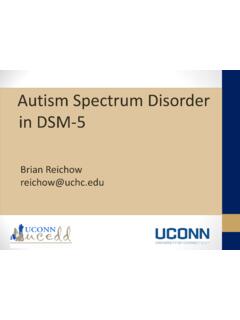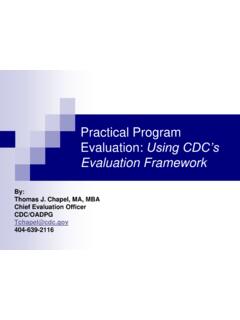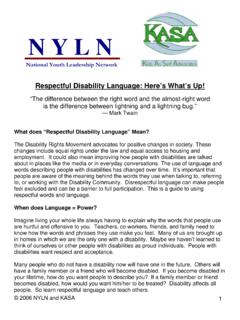Transcription of Supporting Adults with Intellectual and Developmental ...
1 Supporting Adults with Intellectual and Developmental disabilities in their communities By Jean Winsor October 2014. Introduction opportunities to make Encouragement. Professionals in disability Individuals with Intellectual and Developmental services appear to play a relatively minimal role in disabilities (IDD) have told us they want: encouraging Adults with IDD to pursue integrated To be self-determined. Adults with IDD describe employment. In some cases, professionals have self-determination as being able to say what they even encouraged Adults with IDD to choose want or do not want, make their intentions heard, sheltered And family has been found and make and act on to be a significant influence on individuals' decisions To work in the community. Many studies have about found that people with IDD want to work in the Opportunities. Individuals with IDD have said that community.
2 One study of individuals with IDD, their they want opportunities to do meaningful work, family, and support staff found that the majority of demonstrate their skills and talents, choose their people would like employment outside sheltered own careers, and have the same opportunities for workshops, or at least consider it an option. People career advancement as people without surveyed also believe that Adults with Intellectual Respect. Individuals with disabilities expect to disabilities can perform outside workshops. The receive the same level of respect as those without interest in working in the community was not disabilities . associated with the severity of the In another study, individuals with IDD shared A few ways to help make these goals a reality: the reasons they want to work: (a) earnings, (b) 1. Support individuals to fully participate in the productivity, (c) the admiration of others, and (d) person-centered planning process.
3 The quality of social Direct statements and questions to the individual, not others. Individuals with IDD have told us they need the Speak at the individual's language level. following to accomplish their goals: Use accommodations as needed. Support and assistance. This must be offered in a way that allows for individual choice. People with Avoid jargon and patronizing language. IDD have reported that it is difficult to be self- Do not refer to the individual as though they were not determined when others make decisions about in the room or speak about them in the third person. where they work, where they live, and how they Write suggestions on flip charts, use good group spend their money; when they fear that speaking brainstorming skills, and actively involve the out will lead to outcomes they do not want; when individual in the group they state their goals and desires and support staff do not follow through; and when they do not have 4 Nonnemacher, S.
4 L., & Bambara, (2011). I'm supposed to be in charge'': Self-advo- cates' perspectives on their self-determination support deeds. Intellectual and Developmen- tal disabilities , 49(5), 327 340. 1 Nonnemacher, S. L., & Bambara, (2011). I'm supposed to be in charge'': Self-advo- cates' perspectives on their self-determination support deeds. Intellectual and Developmen- 5 Migliore, A., Grossi, T., Mank, D., & Rogan, P. (2008). Why do Adults with Intellectual disabili- tal disabilities , 49(5), 327 340. ties work in sheltered workshops? Journal of Vocational Rehabilitation, 28, 29 40. 2 Migliore, A., Mank, D., Grossi, T., & Rogan, P. (2007). Integrated employment or sheltered 6 Timmons, et al. (2011). workshops: Preferences of Adults with Intellectual disabilities , their families, and staff. 7 Walker, A. (2011). Checkmate! A self-advocate's journey through the world of employment.
5 Journal of Vocational Rehabilitation, 26, 5 19. Intellectual and Developmental disabilities , 49(4), 310 312. 3 Timmons, J. C., Hall, A. C., Bose, J., Wolfe, A., & Winsor, J. (2011). Choosing employment: 8 Whitney-Thomas, J., & Timmons, J. C. (1998). Building authentic visions: How to support the Factors that impact employment decisions for individuals with Intellectual disability. Intel- focus person in person centered planning. Research to Practice Brief, vol. 4, no. 3. Boston, lectual and Developmental disabilities , 49(4), 285 299. MA: University of Massachusetts Boston, Institute for Community Inclusion. 2. Help each individual develop a life vision and Day and Employment Services long-term goals. This includes allowing the There are four primary types of day and employment individual to try out the range of options and services for individuals served by state IDD agencies: experiences to encourage integrated 3.
6 Consider how you can change your behavior to employment be approachable and accessible, listen without services, judgment, and support the individual to follow community-based through with their non-work services, 4. Help each individual identify the supports facility-based they need to live the life they want. Search out work services, and supports that you don't know about facility-based non- supports should help the individual reach their work services. goals. They should not be chosen because they Service choices make life easier for the support team. affect individual 5. Reframe your thinking about pre-vocational opportunities and services. Effective pre-vocational services are outcomes, and one time-limited, are provided in community settings service type is not (not a segregated facility), have a connection to a prerequisite for competitive employment, and are not necessary another.
7 For every individual. Pre-vocational services, are delivered to further habilitation goals such as attendance, task completion, problem solving, Service General Description interpersonal relations, and safety. They create Integrated Integrated employment services are provided in a community setting a path to competitive employment. Individuals employment and involve paid employment of the competitive are compensated at or above the minimum employment, individual supported employment, group supported wage, and do not receive lower wages or employment, and self-employment supports. fewer benefits than people without disabilities Community- Community-based non-work services support people with disabilities performing similar based non-work to access community activities. These services occur in settings 6. Help individuals and family members face where most people do not have disabilities , and do not involve paid their fears.
8 When deciding about day services, employment of the participant. Activities include general community some Adults with IDD and their families have participation, volunteer experiences, or using community recreation concerns about safety, transportation, long-term and leisure resources. The majority of an individual's time is spent placement, work hours, disability benefits, social in the community. This service category is often referred to as environment, and work skills These are community integration or community participation services. important concerns, but should not block people Facility-based Facility-based work includes all employment services that occur in a from real life in the community. work setting where the majority of employees have a disability. Continuous job-related supports and supervision are provided to all workers. This service category is typically referred to as a sheltered workshop, work activity center, or extended employment program.
9 Facility-based Facility-based non-work includes all services in a setting where non-work the majority of participants have a disability. These services do not involve paid employment. Individuals may participate in community activities, but the majority of an individual's time is spent in the program setting. Continuous supports and supervision are provided to all participants. This service category is also referred to as day activity, 9 Nonnemacher & Bambara. (2011). 10 Nonnemacher & Bambara. (2011). day habilitation, and medical day care programs. 11 Centers for Medicare and Medicaid, CMCS Informational Bulletin, September 16, 2011. 2. 12. Migliore et al. (2008). Supporting Adults with Intellectual and Developmental disabilities in their communities Integrated Employment Employer outreach and negotiation Career development Integrated employment services are provided in a community setting.
10 These services help people Job development with disabilities to obtain and maintain competitive Job analysis employment, build a career, and become a valued Job matching (the interests and abilities of the job member of the workforce. seeker match those of the employer). Ongoing supports may be included as an integrated Job carving: Developing a new job description based employment service if they are needed for the on tasks derived from a single traditional job. The individual to maintain their job. The individual's carved job description contains one or more, but not preferences, interests, and capacities drive the choice all, of the tasks from the original job description. of the job and career. Job creation: Developing a new job description for a new position within the business, fully capitalizing Main categories of integrated employment on the skills and strengths of the employee.












